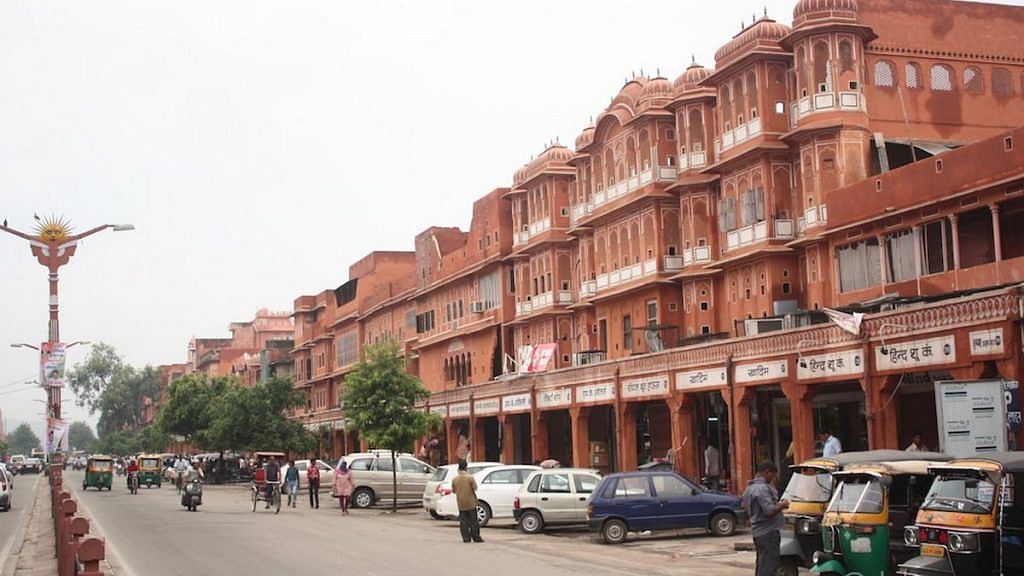Jaipur: After Bhilwara, which has not registered any new Covid-19 cases in 10 days, Rajasthan has now got a new coronavirus hotspot — Ramganj, a predominantly Muslim locality in Jaipur’s Walled City, where at least 100 cases have been reported so far.
Authorities in Ramganj are attributing the cases to a 45-year-old ‘super spreader’ who had come from Oman on 17 March. He allegedly directly infected 17, including 11 of his family members, and a friend on whose bike he used to travel around. The rest of those affected all live in the congested Ramganj locality.
“All cases from the Ramganj area can be traced to this person. He is responsible for passing on the infection directly to 17 people, including his family members, while one of his friends is suspected to have passed it onto almost a dozen people,” said Additional Chief Secretary (Health) Rohit Kumar Singh.
Rajasthan has 430 cases of coronavirus as of Wednesday, with 140 of those, or a third, from Jaipur alone. Nearly 100 of the capital city’s cases are from Ramganj.
Also read: No new Covid-19 case in 4 days, Bhilwara could offer lessons in fight against pandemic
Super spreader ignored quarantine orders
Rajasthan government officials say the 45-year-old man who returned from Oman was found asymptomatic at Delhi airport on 17 March, but was sent home with instructions to quarantine himself.
He allegedly continued to socialise for almost a week until he complained of a fever on 24 March. Tests showed that he was Covid-19-positive.
Officials estimate that he alone met close to 200 people. And of the 32 members in his family, 11 have tested positive.
The extent of the spread can be gauged by the fact that before his arrival in Jaipur, there were just 10 Covid-19 cases, including two Italian citizens.
That number doubled on 30 March, after 10 cases were reported from Ramganj. These included the man’s mother, son and one of his friends.
From 30 March until 4 April, there were at least 40 cases from Ramganj.
Then, 39 more positive cases were reported from the locality on just one day on 5 April.
Of the 11 who tested positive Thursday, eight were from Ramganj, taking Jaipur’s overall tally to 140.
This is more than five times the cases in Bhilwara, where 27 people have tested positive so far.
Also read: Sanitisers to migrant shelters — Rajasthan’s Covid-19 fight is a public-private venture
Area sealed off
After the 45-year-old’s test report came back positive, the state health department and local administration immediately swung into action.
The entire area within 200 m of the patient’s home was cordoned off and a curfew was imposed within a one-kilometre radius on 25 March. His family members were quarantined.
But as more cases were reported, the health department replicated the much talked-about Bhilwara model.
It first placed the entire walled city under a curfew on 30 March and then completely “sealed” it off the next day on 31 March.
No one, except those engaged in providing essential services, are allowed to enter or leave the Walled City. All curfew passes have been cancelled.
State Disaster Response Force teams have been deployed to conduct flag marches and drones are being used to monitor people’s movement. Grocery, cooked food and milk is being home delivered by the administration.
Action has also been taken against violators. More than 6,000 vehicles have been seized and 72 people arrested for violating the prohibitory orders.
Also read: Is talk of lifting lockdown premature or is it necessary to allow some economic activity?
The challenges at Ramganj
Ramganj, though, is quite different from Bhilwara in a number of ways.
According to ACS (health) Rohit Kumar Singh, it is difficult to enforce social distancing in Ramganj as it is a densely populated area.
“It is practically impossible for people to maintain physical distance even if they want to,” he said. “Houses are small with no space between them and shared by large families of 10 to 12 people.”
Besides, there were other challenges like misgivings about surveys by the health department. There were reports of hostility and misbehaviour with team members as people feared that they were taking information for the National Population Register (NPR).
Singh, however, said that the local MLAs, Rafique Khan and Amin Kagzi of the Congress, stepped in and convinced people to cooperate with the survey teams, which made things easier.
Also read: Hotels for mild cases, hospitals for severe ones — govt formula to tackle Covid-19 surge
Finding the virus
To locate all those who interacted with the 45-year-old patient, the Jaipur administration conducted intensive contact-tracing. Various teams were formed and given separate tasks.
One team analysed call details of patient zero, getting information about the people he met, and trace their locations.
Health teams then visited the locations for screening and sample collection and, if needed, sent them for quarantining.
Officials said that one expert advised them to divide the area into clusters for the intensive survey and sample collection.
According to Rajasthan Health Minister Dr Raghu Sharma, the entire area has been divided into 30 clusters on the basis of the health census and 21 samples are being collected from each cluster for testing.
Five mobile vans have also been pressed into service for screening of people. The objective is to quickly identify suspected cases so that they can be quarantined before infecting others.
“We will leave no stone unturned to improve the situation in Ramganj. Intensive survey is being carried out,” ACS (health) Singh said. “We have to screen 2.6 lakh people living in this area. So far, 266 teams have visited 22,022 houses and surveyed 1,16,773.”
Also read: Shops open on alternate days, schools shut — states want to phase out lockdown after 14 April
